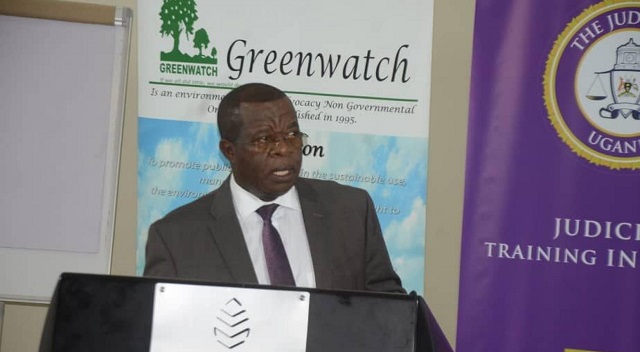
Kampala, Uganda | THE INDEPENDENT | A section of judicial officers have branded government the major culprit in threatening the environment which has resulted in failure to mitigate the effects of climate change.
The effects include a drop in water levels, floods, and changing weather patterns like the drastic change in temperature.
The judicial officers drastically castigated the government from Mestil Hotel in Kampala where they are undergoing two days of training on how to dispense climate justice as they perform their duties.
The training by the Judicial Training Institute -JTI in partnership with Green Watch, a Non-Governmental Organization, is on the theme, “Strengthening the Judiciary’s adjudicative role in administering Climate Justice”.
The Registrar of the Criminal Division of High Court, Didas Muhumuza argued that some of the changes seen as a result of climate change are because of the big ‘developmental’ projects by the government which produce dangerous gases.
He said the moment big projects are put in place, one cannot fail to experience climate change saying that this is like producing babies and expecting to be a virgin again.
According to Muhumuza, government in its bid to develop and support investment projects has become the major culprit in threatening the environment and causing disaster. He asked to be guided on how one can protect the environment without conflicting with the government.
He gave examples of Beatrice Anywar who was previously seen as opposition for protesting against the destruction of Mabira forest, but after she was appointed a member of Cabinet, she is now quiet.
Muhumuza added that he hasn’t heard anyone who has taken up that role Anywar used to do while still in opposition yet government is continuing to give land to investors which later result into environmental disaster.
On his part, the High Court Land Division Judge John Eudes Keitirima said the population increase in the country and also the developments by the government should all be looked into while considering protecting the environment by putting in place mitigating factors.
Keitirima indicated that even if you get a Supreme Court decision, you cannot stop huge projects by the government like the East African Crude Oil Pipeline, a 1,443km crude oil export pipeline that will transport Uganda’s crude oil from Hoima to Tanga Port in Tanzania.
Keitirima said even if you issue an injunction it cannot be respected by government but instead there should be ways of seeing how to balance protecting the environmental rights and as well as allowing projects to continue.
On his part, Justice Kenneth Kakuru of the Constitutional Court noted that if they are to administer climate justice, there is a need to educate themselves as judicial officers, being open to divergent views and using lessons like those from today’s training to make more learned decisions in the courtroom.
Kakuru’s speech was read on his behalf by his colleague Justice Christopher Gashirabake.
The head of Judicial Training Institute Lady Justice Damalie Lwanga called upon judicial officers to embrace laws that govern the environment to ensure that climate justice prevails in the country.
Lwanga who was represented by the JTI Deputy Registrar Moses Gabriel Angualia is optimistic that the training will enhance justice on climate change and also protect Ugandans from climate change effects
In 2021, the leaders of countries that signed the United Nations Framework Convention on Climate Change-UNFCC pledged to further cut emissions of carbon dioxide, a greenhouse gas that causes climate change. Uganda as a signatory committed itself to reducing greenhouse gas emissions by 22 percent by 2030.
*****
URN
 The Independent Uganda: You get the Truth we Pay the Price
The Independent Uganda: You get the Truth we Pay the Price


